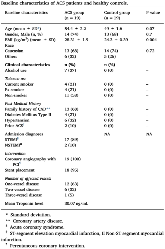Investigating intestinal permeability and gut microbiota roles in acute coronary syndrome patients
Acute Coronary Syndrome (ACS) is a prime cause of morbidity and mortality. Perturbed gutmicrobiota (dysbiosis) and increased intestinal permeability (leaky-gut) with translocation of bacterial antigens, play critical role in obesity and metabolic syndrome, which are also major ACS risk factors. Additionally, Trimethylamine-N-Oxide (TMAO), a metabolite produced by phylum Proteobacteria in gut is implicated in developing ACS. As Proteobacteria is a major source of translocated antigen lipopolysaccharides (LPS), we hypothesized that ACS patients have leaky-gut condition characterized by dysbiosis with increased Proteobacteria, leading to elevated blood levels of TMAO and LPS. Methods: In a pilot case-control study, we enrolled 19 ACS patients (within 72-h of cardiac events) and 19 healthy-controls. Gut barrier function was determined using lactulose-to-mannitol urinary excretion ratio (L/M ratio). Stool microbiome composition was examined using 16S sequencing and predictive functional analysis for LPS biosynthesis pathway by PICRUSt tool. Serum TMAO and LPS levels were measured. ACS patients had increased Gammaproteobacteria compared to controls:1.8 ± 3.0 vs. 0.2 ± 0.4% (P=0.04). Though Proteobacteria level was increased but not statistically significant: 4.1 ± 3.8 vs. 2.1 ± 1.7% (P=0.056). L/M-ratio was three times higher in ACS patients; 0.06 ± 0.07 vs 0.023 ± 0.02, (P=0.014). Interestingly, there was no difference in the mean serum LPS or TMAO levels. Yet, PICRUSt analysis indicated increased Proteobacteria population increasingly contributed to LPS biosynthesis in ACS patients only. ACS patients likely to have leaky-gut and perturbed gut microbiota. Further studies are required to precisely define the role of dysbiosis in ACS.
- Research Organization:
- Los Alamos National Lab. (LANL), Los Alamos, NM (United States)
- Sponsoring Organization:
- USDOE National Nuclear Security Administration (NNSA); Clinical and Translational Science Center (CTSC)
- Grant/Contract Number:
- 20160340ER; 20170671PRD2; 89233218CNA000001
- OSTI ID:
- 1545182
- Alternate ID(s):
- OSTI ID: 1558047
- Report Number(s):
- LA-UR-18-26913; LA-UR-19-31930; S2452231719300107; 100059; PII: S2452231719300107
- Journal Information:
- Human Microbiome Journal, Journal Name: Human Microbiome Journal Vol. 13 Journal Issue: C; ISSN 2452-2317
- Publisher:
- ElsevierCopyright Statement
- Country of Publication:
- Country unknown/Code not available
- Language:
- English
Similar Records
Relationship between serum trimethylamine N-oxide and exposure to dioxin-like pollutants
Gut microbiota and their putative metabolic functions in fragmented Bengal tiger population of Nepal




